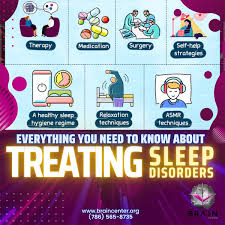Sleeping Disorders: Types, Causes, and Treatment
Sleeping disorders are conditions that affect the quality, timing, and amount of sleep, leading to difficulties in functioning during the day. There are several types of sleeping disorders that can have a significant impact on an individual’s overall health and well-being.
Types of Sleeping Disorders
Insomnia: A common sleeping disorder characterized by difficulty falling asleep or staying asleep.
Sleep Apnea: A condition where breathing repeatedly stops and starts during sleep, leading to poor sleep quality.
Narcolepsy: A neurological disorder that causes excessive daytime sleepiness and sudden attacks of sleep.
Restless Legs Syndrome (RLS): An uncomfortable sensation in the legs that leads to an irresistible urge to move them, often disrupting sleep.
Causes of Sleeping Disorders
Sleeping disorders can be caused by various factors, including:
- Stress and anxiety
- Poor sleep habits
- Medical conditions such as asthma or arthritis
- Medications that disrupt sleep patterns
- Cognitive Behavioral Therapy for Insomnia (CBT-I): A structured program that helps individuals identify and change behaviors that contribute to insomnia.
- Continuous Positive Airway Pressure (CPAP) therapy for Sleep Apnea: A device that delivers a constant flow of air to keep the airways open during sleep.
- Medications: In some cases, doctors may prescribe medications to help improve sleep quality or manage symptoms of certain sleeping disorders.
- Maintain a consistent sleep schedule, even on weekends
- Create a relaxing bedtime routine to signal your body it’s time to sleep
- Avoid caffeine and heavy meals close to bedtime
- Keep your bedroom dark, quiet, and at a comfortable temperature
- Limit exposure to screens (phones, computers) before bed
- Exercise regularly but not too close to bedtime
- Consider seeking professional help if you have persistent sleep issues
- Practice relaxation techniques like deep breathing or meditation
Treatment for Sleeping Disorders
The treatment for sleeping disorders depends on the specific type and underlying cause. Some common treatment options include:
If you suspect you have a sleeping disorder or are experiencing persistent sleep disturbances, it is important to consult a healthcare professional for proper diagnosis and treatment. Addressing sleeping disorders early can help improve your overall health and quality of life.
8 Essential Tips to Overcome Sleeping Disorders
Maintain a consistent sleep schedule, even on weekends
Maintaining a consistent sleep schedule, even on weekends, is crucial for managing sleeping disorders. Our bodies thrive on routine, and irregular sleep patterns can disrupt the natural sleep-wake cycle, making it harder to fall asleep and stay asleep. By going to bed and waking up at the same time every day, including weekends, you can help regulate your body’s internal clock and improve the quality of your sleep. Consistency in your sleep schedule can contribute to better overall sleep hygiene and may alleviate symptoms of certain sleeping disorders over time.
Create a relaxing bedtime routine to signal your body it’s time to sleep
Creating a relaxing bedtime routine can be a powerful tool in managing sleeping disorders. By establishing a consistent set of calming activities before bed, such as reading a book, taking a warm bath, or practicing gentle yoga, you signal to your body that it’s time to wind down and prepare for sleep. This routine helps reduce stress and anxiety, making it easier to transition into restful slumber. Over time, your body will learn to associate these rituals with sleep, promoting better sleep quality and overall well-being.
Avoid caffeine and heavy meals close to bedtime
To improve your sleep quality and reduce the risk of sleeping disorders, it is advisable to avoid consuming caffeine and heavy meals close to bedtime. Caffeine is a stimulant that can interfere with your ability to fall asleep and stay asleep, leading to disrupted sleep patterns. Similarly, consuming heavy meals before bedtime can cause indigestion and discomfort, making it harder for your body to relax and enter into a restful sleep state. By being mindful of your caffeine intake and meal timing, you can create a more conducive environment for a peaceful night’s rest.
Keep your bedroom dark, quiet, and at a comfortable temperature
To improve your sleep quality and reduce the risk of sleeping disorders, it is essential to create an optimal sleep environment in your bedroom. Keeping the room dark, quiet, and at a comfortable temperature can significantly enhance your ability to fall asleep and stay asleep throughout the night. Darkness signals to your body that it’s time to rest, while minimizing noise disturbances helps maintain a peaceful atmosphere conducive to relaxation. Additionally, maintaining a comfortable temperature ensures that you are not too hot or too cold, allowing your body to regulate its internal temperature for better sleep quality. By implementing these simple adjustments in your bedroom environment, you can promote restful and rejuvenating sleep each night.
Limit exposure to screens (phones, computers) before bed
Limiting exposure to screens, such as phones and computers, before bed is a crucial tip for managing sleeping disorders. The blue light emitted by screens can disrupt the body’s natural sleep-wake cycle, making it harder to fall asleep and reducing the overall quality of sleep. By avoiding screens at least an hour before bedtime, individuals can help their bodies produce melatonin, a hormone that regulates sleep. This simple adjustment to bedtime routines can significantly improve sleep quality and promote better overall health and well-being.
Exercise regularly but not too close to bedtime
Regular exercise is beneficial for overall health and can also help improve sleep quality. However, it is important to time your workouts appropriately to avoid disrupting your sleep patterns. Exercising too close to bedtime can elevate your heart rate, increase adrenaline levels, and make it difficult for your body to relax and prepare for sleep. To optimize the benefits of exercise on sleep, aim to finish your workout at least a few hours before bedtime to allow your body to wind down and promote a restful night’s sleep.
Consider seeking professional help if you have persistent sleep issues
It is essential to consider seeking professional help if you are experiencing persistent sleep issues. Consulting with a healthcare professional, such as a doctor or sleep specialist, can provide valuable insights into the underlying causes of your sleep problems and guide you towards appropriate treatment options. Addressing sleep disorders early on with professional assistance can significantly improve your quality of sleep and overall well-being.
Practice relaxation techniques like deep breathing or meditation
To improve sleep quality and manage sleeping disorders, it is beneficial to incorporate relaxation techniques such as deep breathing or meditation into your bedtime routine. These practices can help calm the mind, reduce stress and anxiety levels, and promote a sense of relaxation that is conducive to falling asleep more easily. By engaging in these relaxation techniques regularly, you may experience improved sleep patterns and overall well-being.




